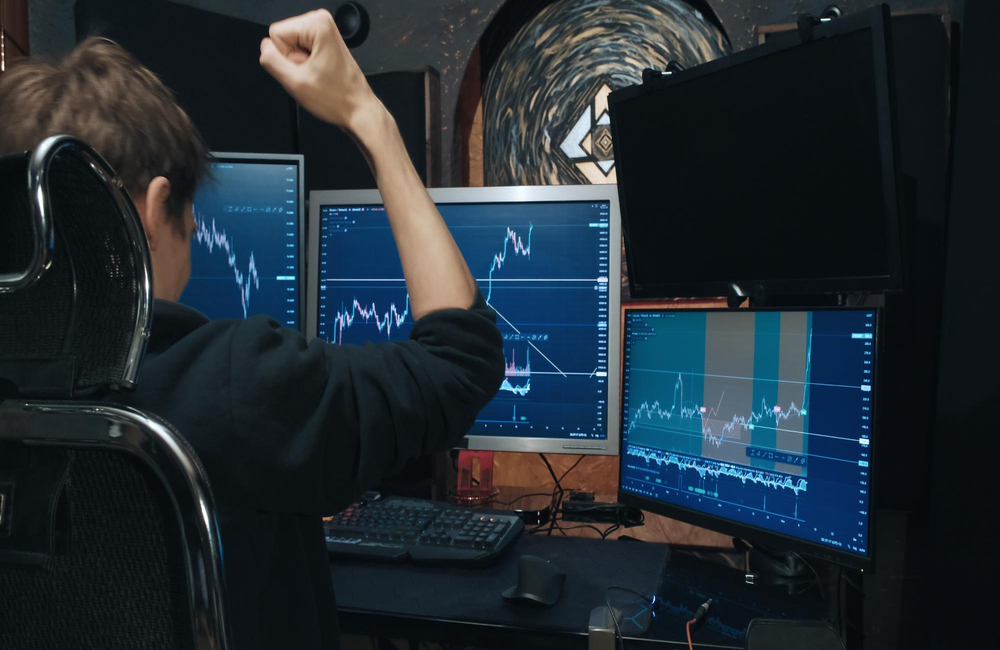ASX futures had risen 4 points or 0.05 percent to 6986 near 8:00 am AEST, pointing to an upbeat start to trading.
US stocks gained Wednesday, adding to a recent winning streak as investors gauged strong earnings reports from technology companies against weaker economic reports.
The Dow Jones Industrial Average was up 0.6%. The S&P 500 gained 0.9 percent as traders sent the index to a fourth day of gains in a row. The index gained 5.1% over the three previous sessions.
The Nasdaq Composite gained 0.5%. The tech-heavy index rose more than 1% earlier in the session, boosted by a profit surge from Google parent Alphabet, but was unable to hold on to those gains.
On the local front, the S&P/ASX 200 gained 1.2% to 7087.7, continuing to recover from its worst January since 2008. The benchmark rode the coattails of US stocks, as nine of 11 sectors closed in the green.
BHP, Rio Tinto and Fortescue added between 1.6% and 3.7% each, contributing to a 2.0% rise in the materials sector.
Financials gained 1.05% as the central bank’s Governor Philip Lowe recognized the possibility of a 2022 interest-rate hike. The big four banks NAB, Commonwealth, Westpac and ANZ rose between 0.8% and 1.4%.
The tech sector ended flat, although Computershare rose 4.55% after being upgraded to buy at UBS.
The ASX 200 is up 1.7% in February to date after it fell 6.35% in January.
Abroad, the pan-continental Stoxx Europe 600 rose 0.5 percent. In Asia, Chinese markets were closed for the Lunar New Year holiday. Japan’s Nikkei 225 rose 1.7% as shares of financial firm Nomura and electronics maker Keyence jumped after their earnings reports.
In commodities, gold futures rose $US5, or 0.3%, to $US 1806.80 a barrel; Brent crude climbed 0.5% to $US89.63 after Wednesday’s OPEC meeting where top producers remained committed to moderate output increases; Iron ore unavailable, Lunar New Year holidays.
In bond markets, the yield on the Australian 10-year bond ticked up to 1.91 percent, while the benchmark US 10-year Treasury yield was 1.77 percent. Yields fall when prices rise.
The Australian dollar was worth 71.41 US cents at 8:00am AEDT, compared with the previous close of 71.26. The WSJ Dollar Index, which tracks the US dollar against 16 other currencies, slipped for a second day to 89.76.
Asia
Chinese and Hong Kong share markets are closed for the Lunar New Year holidays.
Japan’s Nikkei Stock Average added 1.7% after almost all sectors gained in response to Wall Street’s rise overnight. Keyence gained 6.2% after its nine-month net profit jumped 65% on year. ANA Holdings surged 6.2% after reporting 3Q operating profit. Nomura Holdings gained 6.8% after its 3Q net profit exceeded the analysts' consensus estimate.
Europe
The European stocks only managed to push out gains following a morning of tumultuous trading on US indices. Over in Europe, the pan-European Stoxx 600 ticked 0.45% higher.
In London, the FTSE 100 climbed 0.75%, regaining 7,600 points following the deluge of buying seen earlier in the week, albeit at a more measured tempo.
“Having jumped higher in earlier sessions, it's been a little harder going for the gains for equity markets, although the overall picture still looks bright,” IG Group says.
“The tech and telecoms sector has been the best performing part of the UK today, with the likes of Auto Trader Group PLC benefiting from a broker upgrade from Jefferies, while Vodafone Group PLC and BT Group PLC are also higher, as investors assess today’s results from Vodafone, and ahead of BT’s results tomorrow,” CMC Markets UK says.
North America
US stocks climbed Wednesday, extending a recent winning streak as investors weighed strong earnings results from technology companies and weak economic reports.
The Dow Jones Industrial Average gained 0.6%. The S&P 500 climbed 0.9 percent as traders lifted the index to a fourth straight day of gains. The index gained 5.1% in the previous three sessions.
The Nasdaq Composite rose 0.5%. The tech-focused index had jumped more than 1% earlier in the session on the back of a profit blitz from Google parent Alphabet, before that rally lost steam.
Stocks have rebounded in recent days after their worst month since the pandemic started. Signals from Federal Reserve officials about plans to tighten monetary policy more aggressively than they had previously anticipated to battle inflation undercut sentiment and fueled a sell-off in growth stocks.
“Well, earnings are obviously taking center stage. We’ve had some strong results from major tech companies. But eventually we will have sentiment shifting back to macro data and the Fed. We think we will be oscillating between those two nodes,” said Luc Filip, head of investments at SYZ Private Banking. “For financial markets, that equates to increased volatility.”
With earnings season now about halfway through, the number of companies that have beaten Wall Street’s expectations on sales and profit this quarter is above average, though below earlier in the recovery, analysis from Deutsche Bank shows.
Corporate earnings have been decent, but that is being countered by not only the Fed change in monetary policy but the fact that the central bank is hiking in an economy that appears weak, said Barclays Capital Managing Director Maneesh Deshpande. “They’re both a problem right now,” he added. “This time earnings may not save the day.”
Shares of Alphabet, Google’s parent company rose 8.1 percent after profit increased by a third in the most recent quarter. The search giant also announced a 20-for-1 stock split. The chip maker Advanced Micro Devices rose 4.8 percent after reporting revenue and a sales outlook above analysts’ forecasts, lifting shares of Xilinx, a semiconductor company that Advanced Micro Devices intends to acquire, 4.4 percent.
“This has helped turn things around. It reminded people that earnings growth is not just a story about the future, the gravy to come. Some of these companies are delivering today,” said John Roe, head of multi asset funds at Legal & General Investment Management. Monday’s rebound in the Nasdaq and the stock market overall came as investors have been buying the dip after the Nasdaq pulled back into correction territory last month, down more than 10% from its latest high, he added.
PayPal plunged 25 percent, heading for its worst one-day performance on record, after the company reported lower earnings and higher expenses and scrapped an ambitious growth strategy. It marks an about-face from the previous two years, when PayPal was a darling of investors, as the pandemic-fueled online shopping boom rose.
PayPal shares were trading near their lowest level since May 2020 and other consumer-facing stocks were lower, too. The parent of Square, Block, dropped 11%, and Starbucks slipped 1.3 percent after it said costs are rising and will continue to erode its profits in the months ahead.
Alphabet added around $115.8 billion in market cap on Wednesday just over twice as much as PayPal lost ($52.9 billion). Since Alphabet is in the S&P 500’s communication-services sector, its gains have helped make that sector the index’s leading one on the day, up 3.3 percent on the day. In fact, the sector has climbed nearly 11% during the past five sessions, including Wednesday, its best five-day run since 2009, according to Dow Jones Market Data.
Meta Platforms, the company formerly known as Facebook, and Spotify, T-Mobile US and Qualcomm are scheduled to report results after the close of markets.
The yield on the benchmark 10-year Treasury note fell to 1.765% from 1.799% on Tuesday.
According to the report from ADP, the US nonfarm private sector shrank by approximately 301,000 jobs in January. Economists had been anticipating a jump. Labour market data has been mixed recently, with one report on Tuesday showing a rise in job openings and a high quit rate in December.
























